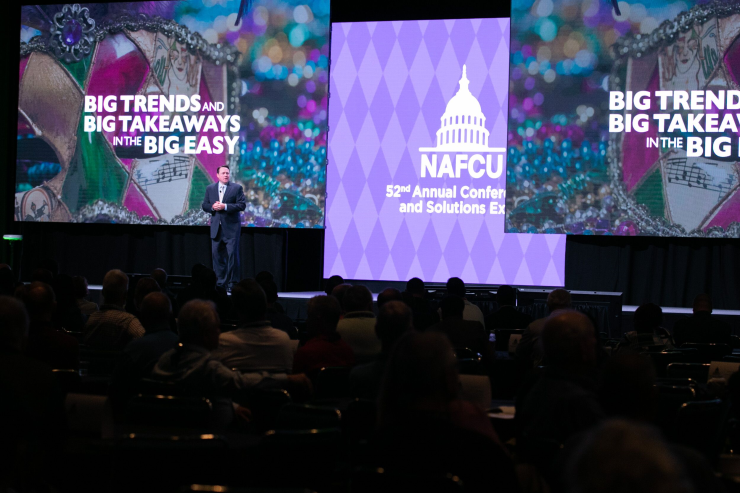NEW ORLEANS – The credit union industry’s reputation has been tested recently but remains strong.
That was one message from B. Dan Berger, president and CEO of the National Association of Federally-Insured Credit Unions, during the trade group’s annual conference here. He hit upon the trust credit unions have built with members during his opening address and discussed the potential effects of recent stumbles in an interview afterwards with Credit Union Journal.
“Turn on the news. Check your Twitter feed. Take a look at Facebook,” Berger said on Wednesday during his opening remarks. “The world around us is chaotic. We’re living through stressful times. Right now, people are feeling anxious about the future and uncertain about their own financial security.”

Berger cited during the speech the Edelman Trust Barometer, which has found that only one in five people believe the system is working for them. In contrast, 46% said the system was failing them.
But consumers “do trust local financial institutions,” Berger said during the speech. “Places where they can build real relationships with real people who treat them fairly.”
Trust is essential in the industry’s future, especially when it comes to recruiting millennials as employees and members, said Brian Best, president and CEO of GTE Financial in Tampa, Fla. The $2.1 billion-asset institution embarked on a three-year initiative with the Center for Generational Kinetics, a research firm, to recruit millennial employees through social media, especially LinkedIn, and by word of mouth.
Roughly 47% of GTE’s members are millennials while 53% of employees fall into this demographic, Best said.
“Millennials want to see other millennials in the branches. They don’t want to see Brian Best helping them,” he said. “That helps to establish trust.”
This is important as more members come to branches for advice and fewer stop by to complete basic transactions, he added.
“Millennials are seeking a place where they can get a trusted adviser,” Best said. “They go in for that help, not transactions. And if we build that trust, they will be a member for life.”
However, the credit union industry’s reputation continues to be tested. For instance, the New York Times recently ran a series of stories about alleged abuses by
Bankers have also used the issue to argue that NCUA shouldn’t expand credit unions access to non-member deposits and
Additionally, the Consumer Financial Protection Bureau, 44 states and the District of Columbia announced last week a

These missteps are concerning but won’t cause long-term harm to the industry, said Berger, who called the taxi medallion lending issues “a little bit of a wart.”
“It’s something we get concerned about. But overall you are talking about a couple of outliers,” Berger said during an interview. “We have close to 6,000 credit unions across the country. It is a concern but the overall reputation of our industry will be difficult to ding as much as the bankers will try to do it.”
Credit union executives at the conference, however, seemed keenly aware of the balancing act they face in the public eye.
"Reputational risk is something that everyone needs to manage,” said David Kish, a director at Purdue Federal Credit Union in West Lafayette, Ind.
Still, credit unions can’t rely solely upon trust to attract members, Kish added. Although trust is extremely important, consumers are also looking for access to the latest technology and services. That can be hard for smaller credit unions to provide, he added.
“The tough part is when competing rivals – some that are bigger – can roll out platforms and be innovative,” Kish said. “That lets them develop products and to be early adopters. It can be a challenge to keep up.”





